Elizabeth Fuller (1775-1856) was 14 years-old, when she started keeping a diary. She made regular entries from October 1790 through December 1792. She lived with her family on a farm in Princeton, Massachusetts.
Pehr Hillström (Swedish artist, 1732-1816) A Young Woman Spinning,
Weaving is the process that creates all kinds of things, such as: clothes, towels, sheets, blankets, & sails to name a few. In early America almost all fabric was imported from England. Though England dominated the American market, the colonies had domestic producers, mostly in the northeast. Some southern planters had their slaves make cloth, keeping agricultural laborers busy off-season & in bad weather. However, when trade in the United States became restricted during the period before & during the Revolutionary War, weaving not only became a necessity, but a patriotic duty.
The
Boston Chronicle in April, 1766, wrote that women there
"exhibited a fine example of industry, by spinning from sunrise until dark." Spinning bees were held in early America to encourage the production of yarn to provide homespun fabric. In the 1760's these events became popular as a means to demonstrate opposition of the importation of heavily taxed British goods and for the mutual aid for those in their community. The tradition continued after the conflict had ended.
However, spinning was a domestic chore not much practiced in colonial Virginia, as it was very time-consuming, and most cloth was imported. It would take 12 spinners of wool to keep a weaver busy at the loom, and 100 spinners of cotton to keep a full-time weaver busy. The technology of the spinning wheel dates to 500 B.C. in India.
Unmarried young women in rural New England during the 18C, often spent their days at home engaged primarily in textile production for both their own family's use & to trade for other items. Elizabeth Fuller washed, carded, & spun wool, while assisting with everyday chores such as making cheese & cooking. The term spinster, once used to denote an occupation, began to refer to an unmarried woman in the 18C, as many continued to spend their days making textiles for the use of their extended families.
Platt Powell Ryder (American artist, 1821–1896) A Young Woman at Spinning Wheel
Oct 1790
13 — Mrs. Perry, Miss Eliza Harris, Miss Sally Puffer, and Miss Hannah Haynes, and Wareham, and Rebekah Hastings were baptised by immersion. — I was fifteen to-day.
14 — A hard storm. Mr. Eveleth was buried.
18 — Pa and Ma set out for Sandwich. I am quite sick, don’t sit up but very little.
21 — I was so bad that we sent for Dr. Wilson. When he came he told me I had a settled Fever.
1790 Nov.
5 — Nathan Perry here about an hour this eve. I am a good deal better, have been out of my room two or three times. 8 o’clock Pa and Ma came home, we were over joyed to see them, but had done expecting them.
7 — Sabbath, no preaching in town.
11 —Timmy went to mill.
14 — Sabbath. Mr. Sparhawk preached, came here at night.
19 — Nathan Perry here this evening.
20 — Leonard Woods here this morn. Mrs. Perry here this afternoon a visiting.
21 —Sabbath. Mr. Brown of Winchendon preached.
22 — Revd. Mr. Brown breakfasted with us this morning. He is an agreable pretty man.
23 — Mr. Gregory killed a cow for Pa.
24 — We baked two ovensfull of pyes. — Mr. Nathan Perry here this eve.
25 — Thanksgiving to-day we baked three ovensfull of pyes. There was no preaching so we had nothing to do but eat them. The pyes were a great deal better than they were last Thanksgiving for I made them all myself, and part of them were made of flour which we got of Mr. H. Hastings therefore we had plenty of spice.
26 — Mr. Ephriam Mirick here. Pa went to town meeting.
27 — Mr. Gregory killed our hogs to-day.
28 — There is no preaching in this town. There came a considerable snow last night.
30 — Caty Eveleth was married the 22nd inst.
1790 Dec.
1 - I went to Mr. Perry’s to make a visit this afternoon, had an excellent dish of tea and a shortcake. — Betsey Whitcomb at work there. Had a sociable afternoon.
2 — Silas Perry here to-day before sunrise. Pa is very poorly having a very bad cough. I am a good deal afraid he will go into a consumption. Oh! if my soul was formed for woe how would I vent my sighs My grief it would like rivers flow, from both my
streaming eyes. I am disconsolate to-night.
4 — I minced the Link meat.
6 — Timmy has gone to the singing meeting.
11 —Sabbath. David Perry here to borrow our singing book.
16 — John Brooks here killing our sheep. A severe snow storm.
17 — Very cold. I made sixteen dozen of candles.
19 — Sabbath cold enough to freeze fools but I was so wise I would have gone to meeting had not Ma kept me at home. I had not sense enough to more than balance my folly. Pa went to meeting, got there time enough to hear three hims and the prayer, but it was as much as ever he did. Mr. Lee preached.
21 —James Mirick is here, says Ephraim is gone to Fitzwilliam to bring Mrs. Garfield and her household stuff down.
22 — David Perry here to get Timmy to go to the singing school with him.
24 — I scoured the pewter. Pa went to Fitchburg.
26 — Sabbath. Stormy weather. We all stayed at home. Pretty warm.
28 — Cold and pleasant to-day. Pa sold his mare, is to have eleven dollars and a cow. Pa and Timmy went to Mr. Holden’s in Westminster to drive the cow home. She behaved so bad they did not get her farther than Mr. Dodd’s. Mr. Woods here to borrow some books of Pa.
30 — Very pleasant. Mr. Eveleth’s personal estate vendued. Pa and Tim gone there.
31 — Cloudy and cold, evening. Mr. Nathan Perry herethis evening...
1791 Mar.
1 — Pa went to Mr. Stephen Brighams to write his will. Ma began to spin the wool for Pa’s coat. I card for her & do the household work.
2 — Ma is a spinning.
3 — Ma spun three skeins. — Nathan Perry here. — Pa is gone to Mr. Hastings this eve.
4 — Mrs. Perry here to spend the afternoon.
5 — Ma spun.
6 — Sabbath, no Meeting in Town.
7 — very warm. Anna Perry here visiting. — I made 18 dozen of candles & washed.
8 — Ma spun.
9 — Miss Eunice Mirick here a visiting this afternoon.
10 — Warm and rainy. — Francis Eveleth here to borrow our singing Book. Ma spun.
11 — Rainy weather. Mr. Thomson here to-day after rates. Mr, Parmenter here, bought two calf skins of Pa, gave him ten shillings apiece. — David Perry here. — Timmy went to Mr. Brooks.
12 — David Perry here to-day.
13 — Sabbath no Meeting.
14 — March Meeting Mr. Crafts asked a dismission, had his request granted without the least difficulty, so now we are once more a free people ha ha, he is going to Weymouth to keep shop a going out of Town this week 'tis thought he has not much to carry with him I do not know nor care what he has.
15 — Revd. Mr. Rice & Mr. Isaac Thomson here. Mr. Rice Dined here.
16 — Pa went to Mr. Bangs to-day.
18 — Capt. Clark here this evening.
19 — John Brooks here to-day. — Nathan Perry here for the newspaper. — Ma spun two skeins & an half of filling yarn.
20 — Sabbath. Pa went to church Mr. Saunders Preached, he is one of Stephen Baxters classmates, the going was so bad that none of the rest of our Family went to hear him.
21 —- Cold. Mr. Brooks here.
22 — Pa went to Mr. Bangs.
23 — Pa went to Mr. Rolphs to-day. On the 13th inst. Miss Caty Mirick was Married to Mr. Joshua Eveleth.
24 — Mr. Brooks here to-day to get Pa to write a Deed of Mr. Hastingses Farm for him.
25 — Ma finished spinning her blue Wool to-day.
26 — Ma went to Mrs. Miricks to get a slay Harness. Mrs. Caty Eveleth came home with her.
27—Sabbath very pleasant I went to church. Mr. Rolph Preached. — Esqr. Woolson here to tarry all night.
28 — Esqr. Woolson went from here this morning. A man here to-day that was both deaf and dumb, he is Son to a Merchant in London, he went to sea & the ship was struck with Lightning & which occasioned his being deaf & dumb, he could write wrote a good deal here. He was a good looking young Man, about 25 he wrote his name Joel Smith. I really pitied him. I went to Mrs. Miricks & warped the piece.
29 — Mrs. Garfield came here to show me how to draw in Piece did not stay but about half an hour.
30 — I tyed in the Piece & wove two yards.
31 — Fast. I went to Meeting all day. Mr. Rolph preached half of the day & Mr. Saunders the other half. Mr. Saunders is a very good Preacher & a handsome Man. — David Perry here this evening to sing with us.
1791 April
1 — I wove two yards and three quarters & three inches to-day & I think I did pretty well considering it was April Fool day. Mr. Brooks & Mr. Hastings here to get Pa to do some writing for them.
2 — I wove three yards and a quarter,
3 —Sabbath. I went to church. — an anular eclipse of the sun, it was fair weather. 4— I wove five yards & a quarter. Mr. Cutting here this eve.
5 — I wove four yards. Mrs. Garfield & Mrs. Eveleth who was once Caty Mirick here a visiting. —The real estate of Mr. Josiah Mirick deceased is vendued to-day. (eve) Timmy has got home from the vendue Mr. Cutting has bought the Farm gave 255£ Sam Matthews has bought the part of the Pew gave eight dollars.
6 — I got out the White piece Mrs. Garfield warped the blue, came here & began to draw in the Piece.
7 — I finished drawing in the Piece & wove a yard & a half. Sam Matthews here to-day.
8 — I wove two yards & a quarter.
9 — I wove two yards & a quarter.
10 — Sabbath. I went to church in the A.M. Mamma went in the P.M. she has not been before since she came from Sandwich.
11 —I wove a yard & a half. Parmela Mirick here to see me.
12 — I wove to-day.
13 — Mrs. Brooks here a visiting. I wove.
14 — I got out the Piece in the A.M. Pa carried it to Mr. Deadmans. Miss Eliza Harris here.
15 — I began to spin Linnen spun 21 knots. I went to Mr. Perrys on an errand. Pa went to Mr. Matthews to write his will & some deeds. He has sold Dr. Wilson 20 acres of Land & given Sam a deed of some I believe about 25 acres.
16 — Pa went to Mr. Matthews again. — I spun 21 knots.
17 — Sabbath I went to church all day Mr. Davis Preached Mr. Saunders is sick.
18 — I spun two double skeins of Linnen.
19 — I spun two double skeins.
20—I spun two double skeins. — Ma went to Mrs. Miricks for a visit was sent for home. — Revd. Daniel Fuller of Cape Ann here to see us.
21—Revd. Mr. Fuller went from here this morn. Ma went to Mrs. Miricks again. — I spun two skeins. — Sukey Eveleth & Nabby here to see Nancy.
22 — I spun two double skeins O dear Quadyille has murdered wit, & work will do as bad, for wit is always merry, but work does make me sad.
23 — I spun two skeins. Nathan Perry here. — Ware-ham Hastings at work here.
24 — I went to church. Mr. Thurston Preached. — Mr. Saunders is sick.
25 — Leonard Woods here all this forenoon, brought Hoi-yokes singing Book. Left it here.
26 — Pa went to see Mr. Saunders. I Pricked some tunes out of Holyokes Singing Book.
27 — I spun five skeins of linnen yarn.
28 — I spun five skeins of linnen yarn. Pa went to Sterling.
29 — I Pricked some Tunes out of Holyokes singing Book. I spun some.
30 — I spun four skeins to-day.
1791 May
1 —Sabbath I went to Meeting to-day.
2 — I spun five skeins to-day.
3 — I spun five skeins to-day.
4 — I spun two skeins to-day finished the Warp for this Piece. — Nathan Perry worked here this P.M.
5 — I spun four skeins of tow for the filling to the Piece. I have been spinning, Pa went to Worcester to get the newspaper. Nathan Perry here this eve.
6— I spun four Skeins to-day.
7 — I spun four Skeins to-day.
8 — Sabbath. I went to church A.M. Mr. Thurston preached. Mr. John Rolph & his Lady & Mr. Osburn her Brother & a Miss Anna Strong (a Lady courted by said Osbourn) came here after Meeting and drank Tea.
9 — I spun four skeins. Mr. Thurston here this P.M. a visiting he is an agreeable Man appears much better out of the Pulpit than in.
10— I spun four Skeins to-day.
11 — I spun four skeins.
12 — I spun four skeins. Lucy Matthews here.
13 — I spun four skeins. — Ma is making Soap. Rainy.
14 — I spun four skeins. Ma finished making soap and it is very good.
15 — I went to church A. M. Mr. Thurston Preached he is a ——. — Mr. Rolph drank Tea here.
17 — I spun four skeins to-day.
18 — I spun four skeins of linnen yarn to Make a Harness of. — Ma is a breaking.
19 — I spun two skeins and twisted the harness yarn.
20— Mrs. Garfield came here this Morning to show me how to make a Harness, did not stay but about half an Hour. — Mrs. Perry & Miss Eliza Harris here a visiting.
21 — I went to Mrs. Miricks and warped the Piece.
22 — I went to church in the A.M. Mr. Saunders preached gave us a good sermon his text Romans 6th Chap. 23 verse. For the wages of Sin is Death.
23 — I got in my Piece to-day wove a yard.
24 — Wove two yards & an half.
25 — Election. I wove three Yards to-day. — Mrs. Perry here a few moments.
26 — I wove three Yards to-day. The two Mrs. Matthews here to Day. I liked Sam’s Wife much better than I expected to. — Miss. Eliza Harris here about two Hours.
27 — I wove five Yards to-day.
29 — Pleasant weather. Pa went to Sterling. My Cousin Jacob Kcmbal of Amherst came here to-day.
30 — General Election at Bolton. — Mr. Josiah Eveleth & Wife & Mrs. Garfield here on a visit.
1791 June
1—Moses Harrington carried off Mr. Hastings old shop.
2—Elislia Brooks here to-day.
5—I made myself a Shift. — Mrs. Perry here a visiting. Nathan Perry here this evening.
6—Sabbath. No Meeting in Town. Elisha Brooks here to see if there was a meeting.
7—I made myself a blue worsted Coat.
8—Aaron & Nathan Perry here. — Pamela Mirick here a visiting this afternoon.
9—Mrs. Brooks here a visiting. — I helped Sally make me a blue worsted Gown.
10—I helped Sally make me a brown Woolen Gown.
12—Sally cut out a striped lutestring Gown for me.
13—Sabbath I went to church. Mr. Green Preached.
14—Aaron Perry here.
15—I cut out a striped linnen Gown. — Sally finished my lutestring.
16—Rainy weather. Ma cut out a Coattce for me. —Salmon Houghton breakfasted with us. — Elisha Brooks spent the afternoon here.
17—Ma, Sally & I spent the afternoon at Mrs. Miricks.
18—Cool. Sally finished my Coattee.
19—I finished my striped linnen Gown. Mr. Soloman Davis here. Sabbath.
20—I went to Church, wore my lutestring, Sally wore hers we went to Mr. Richardsons & Dined. —rained at night.
21—Pleasant weather. Mr. Bush here.
22—Capt. Moore here to-day. Put in my dwiant Coat & Sally & I quilted it out before night.
23—Sally put in a Worsted Coat for herself and we quilted it out by the middle of the afternoon. Very pleasant weather.
24—I made myself a Shift.
Source: Francis E. Blake, “Diary Kept by Elizabeth Fuller,”
History of the Town of Princeton (Princeton, Massachusetts: Town, 1915)

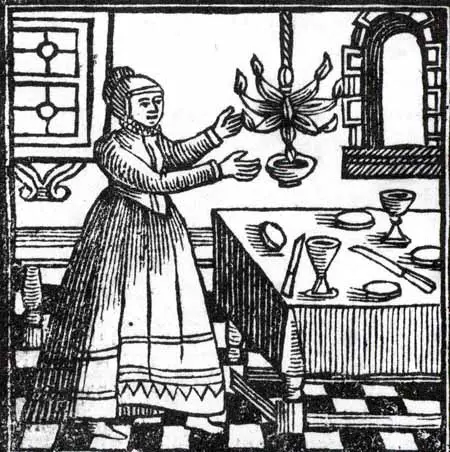

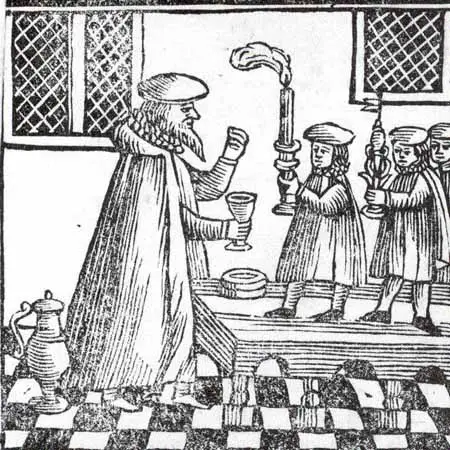

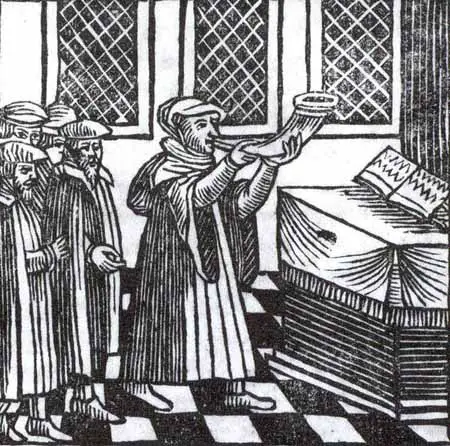

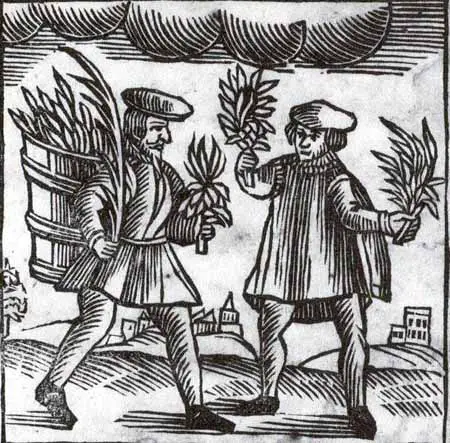

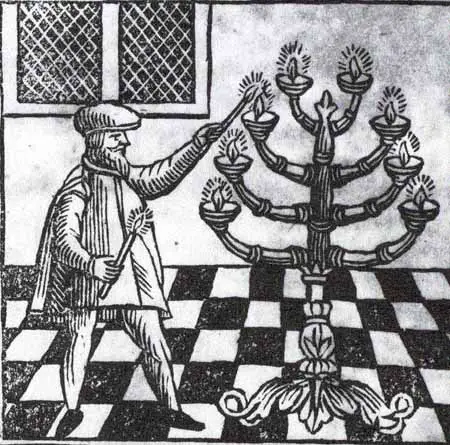

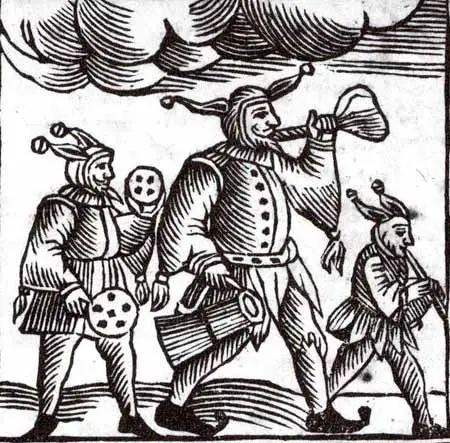

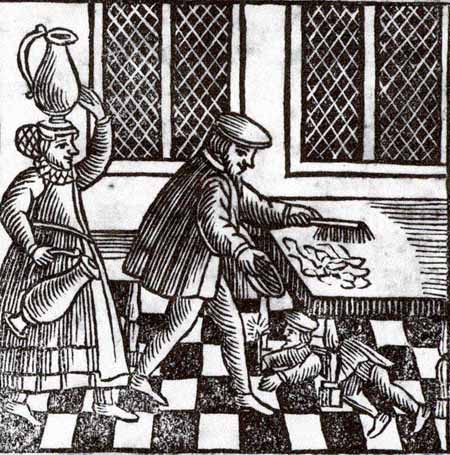

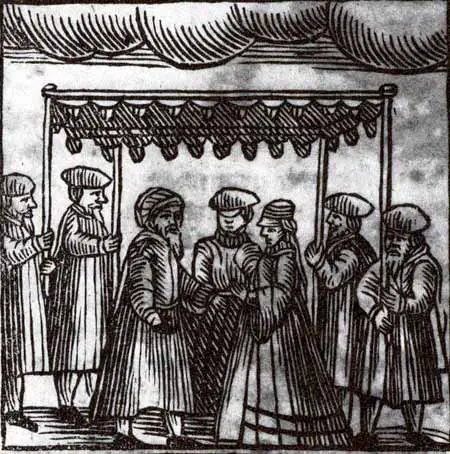

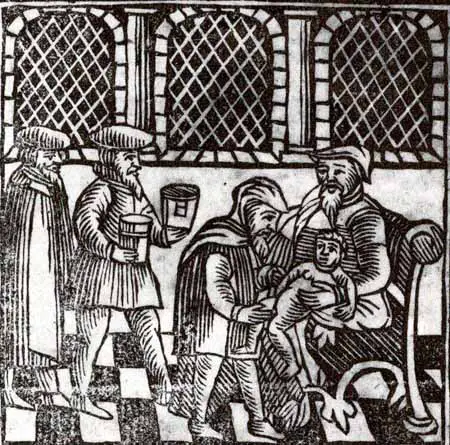

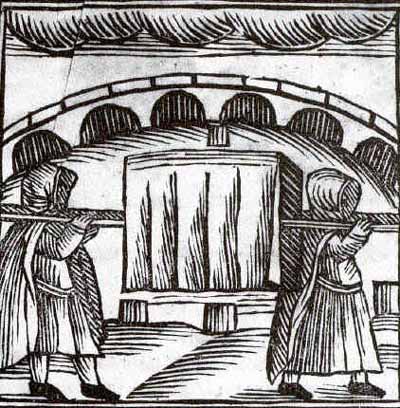





















%2BWoman%2Bat%2BSpinning%2BWheel.jpg)









